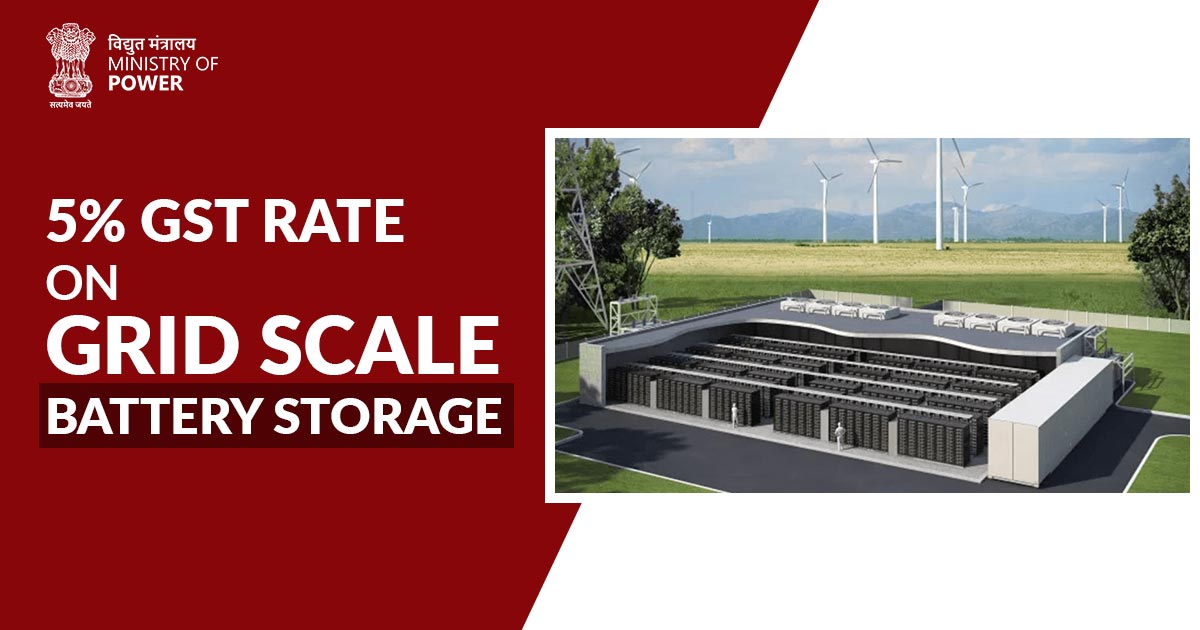
On the grid-scale battery storage, the power ministry would be acknowledging to suggest cutting the GST to 5% for assisting India in the transition to an energy mix with a bigger share of renewables.
There is an 18% GST on the lithium-ion batteries used for utility or grid-scale power projects and 28% for the non-lithium ion batteries.
“There is a consideration over the need for rationalization of GST. Talks are underway and the power ministry may suggest the finance ministry to recommend the GST Council for the rationalization,” a person in concern of the development stated.
On the requirement of the rationalization of the tax, the ministry would be asked for inputs from the state-run Solar Energy Corporation of India Limited and NPTC, another individual stated.
According to norms, the finance ministry selects the suggestions to be presented to the GST Council, and then the council’s committees consult on the topic. The GST council’s fitment committee makes the final determination before recommending it to the council, which is made up of the union finance minister and the state finance ministers.
The ministries of power and finance did not respond to inquiries submitted to them as of press time.
The action, which was taken in response to the finding of high power tariffs from round-the-clock and hybrid power auctions, intends to address the high cost of battery energy storage systems.
“The cost of battery accounts for around 50-60% of the overall cost of setting up a battery energy storage system. A decrease in Goods and Services Tax (GST) would give a boost to this nascent industry as it may lower the cost of battery energy storage systems by 8-10%,” a tax expert stated.
Batteries cost roughly $300 per kilowatt hour (Kwh) on average, and the landed price includes various extra levies.
Because it ensures grid stability, battery storage holds the secret to the energy transition. A large percentage of renewable energy can be accommodated by grid-scale battery storage systems or grid-connected battery energy storage systems (BESS), which also aid in grid stability.
Grid-scale battery storage system adoption has not accelerated yet because of the high associated costs. To reduce costs and boost uptake, the Centre is implementing a number of actions. The Centre is developing a production-linked incentive scheme for grid-scale battery storage valued up to Rs 15,000 crores, a draft of the scheme is expected to be issued shortly.
The budget for FY24 disclosed viability gap funding for the sector. “To steer the economy on the sustainable development path, battery energy storage systems with a capacity of 4,000-megawatt hours will be supported with viability gap funding,” it stated.
As India and numerous other countries rely on imports of lithium, the most common mineral used in battery storage, research on several novel chemistries for battery storage is underway. China supplies a large portion of it.
Energy storage has grown in importance in recent years as a result of major energy transition plans and the goal of achieving 500 GW of installed renewable energy capacity.
Read Also: What If Electricity Comes Under GST Regime in India?
Battery energy storage devices would be crucial to the grid’s stabilization, as well as to ensuring supply during peak demand periods and when solar and wind power are not available. This is necessary for the integration of renewable energy sources into the grid.
Guidelines for the purchase and use of battery energy storage systems as part of generating, transmission, and distribution assets were released by the power ministry last year. India had a battery energy storage capacity of 39.12 MWh as of March 13.